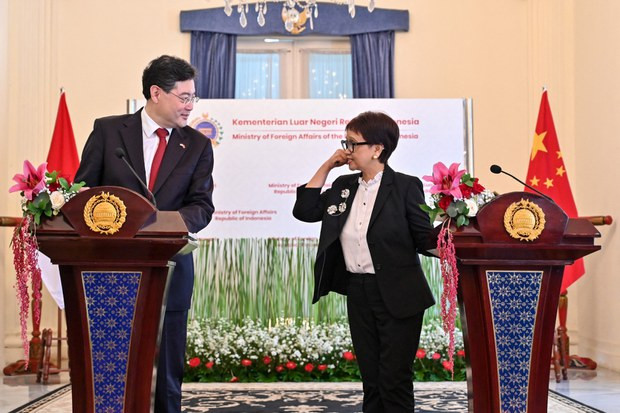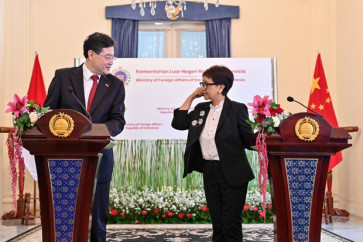Popular Reads
Top Results
Can't find what you're looking for?
View all search resultsPopular Reads
Top Results
Can't find what you're looking for?
View all search resultsQin’s Indonesian tour sped up China-ASEAN relations
China hopes to engage with the top officials of Indonesia and plan for the next decade of bilateral relations, so as to reduce the negative impacts of political changes on bilateral ties.
Change text size
Gift Premium Articles
to Anyone
R
ecently, Chinese Foreign Minister Qin Gang went to Indonesia for a state visit. This was his first outbound visit after Cambodian Prime Minister Hun Sen’s China visit amid Chinese New Year. This is also Qin’s first visit to a neighboring country after he took his new post as foreign minister. So clearly, the strategic significance of Indonesia in China’s neighbor diplomacy has sharply increased.
During the visit, Qin met with President Joko “Jokowi” Widodo and the coordinator for cooperation with China and Coordinating Maritime Affairs and Investment Minister Luhut Binsar Pandjaitan, respectively.
Qin jointly hosted and chaired the fourth meeting of the Joint Commission on Bilateral Cooperation (JCBC) between China and Indonesia with his counterpart. He also visited the ASEAN Secretariat and met with the secretary-general. After the meeting, a joint declaration was released by both sides, in which bilateral and multilateral cooperation are highly stressed.
Therefore, it can be concluded Qin’s visit to Indonesia not only focuses on consolidating bilateral relations between China and Indonesia, but also aims to upgrade China-ASEAN relations to a higher level.
At the bilateral level, this year marks the 10th anniversary of the establishment of the China-Indonesia comprehensive strategic partnership. The two sides need to plan ahead for the next 10 years so as to expand and deepen bilateral cooperation. In practice, the new diplomatic team led by Wang Yi and Qin Gang needs to push forward China-ASEAN relations amid intense China-United States strategic competition in the Asia-Pacific region, in which Indonesia has become a major “breakthrough” for China’s new round of “diplomatic offensives” in Southeast Asia.
Additionally, there will be some uncertainties in Indonesia’s foreign policy after the presidential elections next year. Hence, China hopes to engage with the top officials of Indonesia and plan for the next decade of bilateral relations, so as to reduce the negative impact of political changes on bilateral ties.
Qin’s meeting with Luhut demonstrated that both sides want to promote Belt and Road Initiative (BRI) cooperation and thus to lay a solid economic foundation for a stable bilateral relationship. In recent years, China and Indonesia made remarkable progress in BRI cooperation, especially the successful trial operation of the Jakarta-Bandung High Speed Railway.



















